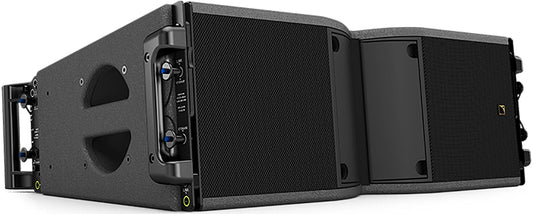
Sports - Stadiums and Arenas
Rely on the seasoned professionals at Solotech to provide expert guidance on audio, stage, and lighting solutions for sports stadiums. Today, sports fans have a seemingly endless variety of leagues and venues to enjoy, from the fields of Major League Baseball and the National Football League to the courts of the US Open, but they all have one thing in common. All sports stadiums require an immersive experience that entertains audiences and elevates sporting events. The dynamic nature of live sporting events requires a comprehensive and integrated approach which is vital to creating an immersive and dynamic environment for both fans and performers.
Below you will find both product specifics and detailed information on the types of solutions expertly offered by Solotech:
Need information or advice on Sports - Stadiums and Arenas?
Industry experts are ready to help.
Line Array (Line Source) Speakers Essentials for Sports - Stadiums and Arenas
-

L-Acoustics KARAII Line Array Loudspeaker
View for quote
JBL CBT 100LA-1 Line Array Column Speaker
View for quote
JBL CBT 50LA-LS Line Array Column Speaker
View for quote

L-Acoustics Kiva II Line Array Loudspeaker
View for quote
JBL CBT 1000-WH Line Array Column Speaker White
View for quote

JBL VRX932LA-1 12-In 2-Way Line Array Speaker
View for quote
JBL VRX932LA-1WH 12" Line Array Speaker White
View for quote
JBL CBT 1000 High-Output Line Array Column Speak
View for quote
Call our Sales Advisors Today to Recieve a FREE Sports - Stadiums and Arenas Consultation
Top Partners In Sports - Stadiums and Arenas
We partner with the best brands in the industry to provide the best options and gurenteed solutions. What ever the project may be, we have it covered. Check out the partners we know have you covered. One hundred-precent satisfactionon is our garuntee and with these partners we know we can deliver.
1 / of 4
Audio Solutions
1. High-Quality Sound Reinforcement: The installation of a high-quality distributed sound system consisting of large-scale line arrays, point source speakers, and subwoofers, strategically positioned to deliver consistent and high-fidelity audio coverage throughout the entire stadium. The system should also have the capabilities to handle live performances, game audio, and announcements with clarity and power.
2. Delay Tower Systems: In larger stadiums with expansive seating areas, delay tower systems can be deployed to ensure that sound arrives synchronously across the venue, minimizing the perception of audio delay and providing a cohesive audio experience for all spectators.
3. Wireless Microphones and In-Ear Monitoring: To support live performances, wireless microphone systems for performers and in-ear monitoring solutions can provide artists with the flexibility and mobility they need while ensuring clear and reliable audio transmission to the audience.
4. Surround Sound and Immersive Audio: Implementing immersive audio formats such as surround sound or object-based audio can significantly enhance the fan experience by creating a sense of envelopment and realism, especially during live events and performances.

Stage Solutions
1. Modular Stage Systems: Versatile and customizable modular stage systems allow for quick setup and reconfiguration to accommodate various event types, ranging from live musical performances to award ceremonies and presentations.
2. Rigging and Truss Structures: Robust rigging and truss systems are essential for suspending lighting fixtures, LED screens, and other production elements above the stage area. Safety and load-bearing capacity are paramount considerations in the design and installation of these structures.
3. Stage Platforms and Flooring: Consideration of stage platforms and flooring materials that can withstand heavy equipment, foot traffic, and exposure to the elements is critical. Slip-resistant surfaces and load-bearing capacity should be prioritized to ensure the safety of performers and crew members.

Lighting Solutions
1. Intelligent Lighting Fixtures: The use of intelligent lighting fixtures, such as moving heads, LED wash lights, and profile fixtures, can create dynamic and visually engaging effects for sporting events, concerts, and other performances. Flexible control options allow for seamless integration with live action and video content.
2. LED Video Screens and Displays: Integration of LED video screens and displays into the lighting design provides opportunities for dynamic visuals, including live video feeds, instant replays, and event-specific content. These elements can enhance the overall spectator experience and contribute to the production value of the event.
3. Lighting Control Systems: Centralized lighting control systems, utilizing DMX protocols and advanced software, enable precise programming and synchronization of lighting cues with audio and visual content. Automation and pre-programmed scenes help create dramatic effects and streamline production workflows.
4. Environmental and Architectural Lighting: Consideration of architectural and environmental lighting solutions for the stadium structure itself, such as facade lighting, landscape illumination, and decorative effects, can contribute to the overall aesthetic appeal and branding of the venue.- Choosing a selection results in a full page refresh.
- Opens in a new window.






















